Photographs: Reuters
Dr Li Zhisui, Mao Zedong's private physician, was a privileged man. On October 1, 1949, he was allowed to stand on the rostrum of Tiananmen Square to attend the ceremonies of the foundation of the People's Republic of China.
It was a 'crisp, clear, and chilly day that makes autumn in Beijing the most magnificent season' recalled the doctor.
'The square was already swarming with people, carefully chosen from all walks of life,' he continued. 'The crowd was shouting slogans "Long Live the People's Republic of China", "Long Live the Chinese Communist Party" and singing revolutionary songs. The enthusiasm was contagious, and everyone grew more excited with every new slogan and song.'
Then the Great Helmsman appeared on the stage: 'Mao had been my hero, he was China's messiah. Mao was a truly magnetic force. Mao's voice was soft, almost lilting, and the effect of his speech was riveting. "The Chinese people have stood up," he proclaimed, and the crowd went wild, thundering in applause, shouting over and over, "Long Live the People's Republic of China!"'.
'I was so full of joy my heart nearly burst out of my throat, and tears welled up in my eyes. I was so proud of China, so full of hope, so happy.'
This was 60 years ago, a full circle in the Chinese calendar.
'Beijing is no longer shying away from contests with US'
Image: A worker sweeps water off a Beijing streetPhotographs: Jason Lee/Reuters
In many ways, the dreams of Dr Li and hundreds of millions of Chinese have come true.
Take the economic field: Much has been written about the Chinese prowess in this sector, but a quick look at the post-financial crisis situation is telling.
The Financial Times on August 24 explained: 'With its quick and overwhelming response to the crisis, Beijing appears to have engineered a powerful V-shaped recovery Official readings of industrial production, fixed investment, power consumption and gross domestic product all show a strong revival, while equity and property prices have soared in recent months. There have even been signs of a recovery in exports, although these are still about one-quarter below the levels of a year ago.'
Beijing knows it and wants the world to be aware of it. On July 30, The People's Daily, the mouthpiece of the Communist Party of China, proudly announced: 'Under the leadership of the Communist Party, the people in China brace up to cope with the financial crisis and have scored marked successes to the worldwide attention. (The West) envies China's superb performance as well as 'China's spirit' -- the kind of solid, unbreakable 'Great Wall' at heart to ward off the financial crisis.'
Willy Lam of the Jamestown Foundation in an essay entitled 'China's Quasi-Superpower Diplomacy: Prospects And Pitfalls, affirmed: 'Seeing itself as a quasi-superpower, Beijing is no longer shying away from frontal contests with the United States, China's strategic competitor.'
When at the end of the 1960s, Mao decided to economically overtake the United Kingdom, everybody thought that it was another mad dream. Sixty years after the parade of October 1, 1949, this dream has become true.
This year, China's GDP will surpass that of Japan, taking the second slot after the US. Thirty years ago, Deng Xiaoping began to promote an open door policy with the same dream.
Jeffrey Sachs, director of the Earth Institute at Columbia University, recently told Xinhua, the Chinese news agency: 'We all believe, at least I believe, that China will relatively soon, within the next three decades perhaps become the world's largest economy So, I think China has a unique position in the world. It's not only the most populous country but it will become the largest economy in the world, and that's rather natural because it's such a large size.'
Nobody can doubt today that China is a super economic power.
India can only look with awe at China's infrastructure development
Image: Smog hovers over Nanpu bridge funded by the Asian Development Bank in ShanghaiPhotographs: Claro Cortes/Reuters
A domain in which China has done exceedingly well is infrastructure.
The Communist regime in Beijing started to invest heavily in roads and airports in remote parts of its new Chinese empire (for example, in the Aksai Chin with a road cutting across Indian territory) in the 1950s, but this development was limited in scope. The purpose was 'to defend the borders'.
It is only relatively recently that China has made tremendous progress in the field of infrastructure; but whoever today visits Shanghai, returns flabbergasted; in this domain, India is 30 or 40 years behind its Asian rival.
Deng Xiaoping's visit to southern China in 1992 was instrumental in revitalising the coastal areas and developing the infrastructure seen today.
Many believe that Deng's southern tour changed the face of China forever. His slogan 'To Get Rich Is Glorious' helped to create a wave of entrepreneurship, which has driven China's economy since.
The new open economic policy announced by Deng in 1978 brought its first results in the early 1980s with the establishment of Special Economic Zones. It was the beginning of the Chinese economic miracle.
Soon after the beginning of the world crisis in September 2008, China's Premier Wen Jiabao declared: 'What we can do now is to maintain the steady and fast growth of the national economy and ensure that no major fluctuations will happen. That will be our greatest contribution to the world economy under the current circumstances.'
This signaled a new massive investment in infrastructure.
On October 21, 2008, China's state council announced a new economic stimulus package. Two weeks later, Beijing confirmed that it would put in place a two year $586 billion (about Rs 29.3 lakh crore) package, mainly dedicated to infrastructure projects. This financial package would finance schemes in 10 major areas, including affordable housing, rural infrastructure, water, electricity, transport, the environment, technological innovation and rebuilding areas hit by disasters.
India can only look with awe at China's infrastructure development.
China wants to project a new image
Image: A member of the People's Liberation ArmyPhotographs: Claro Cortes Iv/Reuters
Defence is another sector where China has taken giant strides since the Revolution. It is definitely linked with the infrastructure boom. On July 24, an article in the People's Daily carried the following title: 'Hu Jintao stresses the importance of the fusion of military and civilian development at a politburo collective study session.'
One detail demonstrates the new self-confidence of the Beijing mandarins: a white paper entitled 'China's National Defence' in 2008 was released in January 2009; and not on any odd date. The Chinese, always fond of symbols, chose the day Barack Obama was sworn in as America's president.
Pundits will also point out that it was Martin Luther King Day, a day dedicated to non-violence: The choice of the state council was certainly not fortuitous.
Though it was not a 'breaking news' type of publication, many interesting trends emerge while going through the white paper's 14 chapters. Amongst these, 'informationisation' and modernisation are the most important aspects.
The white paper is an exercise in public relations for the People's Republic of China, which wants to project a new image: that of a responsible nation, fully involved in global issues facing the planet and ready to help find solutions to these problems.
Some of the old thinking prevails in today's China
Image: People's Liberation Army troops attend a drill in Hefei, Anhui provincePhotographs: Stringer/Reuters
This is certainly progress, though some of the old thinking is still present in today's China.
For example, strategist Jin Yinan, who teaches at the National Defense University in Beijing, recently wrote: 'China cannot emerge in the midst of nightingale songs and swallow dances.' It sounded like Mao for whom 'revolution was not a tea party'. For Jin, if China is to reach its objectives, it had to 'hack out a path through thorns and thistles'.
'When a country and a people have reached a critical moment,' he added, 'the armed forces often play the role of pivot and mainstay.' The fact that Jin was invited in July to give a lecture to the party politburo on military strategies, tends to show that modern China is not rising with nightingale songs (peaceful rise) alone.
In April, Huang Kunlun, another analyst, commented on 'the boundaries of national interests' in the Liberation Army Daily.
He argued that China's national interests had now gone beyond its land, sea and air territories. It included areas such as the oceans used by Chinese oil tankers and even outer space: 'Wherever our national interests have extended, so will the mission of our armed forces given our new historical mission, the forces have to not only safeguard the country's 'territorial boundaries' but also its 'boundaries of national interests'.
For the purpose, the PLA plans to build four aircraft carriers in the coming decade and several nuclear submarines. One understands the statements of former Indian navy chief Admiral Sureesh Mehta and present Indian Air Force chief Air Chief Marshal Pramod Vasant Naik that India is far behind as far as the equipment of its armed forces is concerned.
It is not the 'swallow dances' of the Indian diplomacy, which will counter a quasi-superpower neighbour.
Today, China dares taking on the US
Image: A Chinese renimbi 100 banknote, left, and a US$100 banknotePhotographs: Paul Yeung/Reuters
Assertiveness and soft diplomacy
For many years, Chinese diplomacy was limited in its scope to nearby regions like the ASEAN bloc, the Shanghai Cooperation Organisation or international bodies like the United Nations, the World Bank and the International Monetary Fund. Later, for economic reasons this extended to Africa and Latin America.
Willy Lam, in his essay of quasi-superpower diplomacy, says: 'The financial crisis that was precipitated by the collapse or near-bankruptcy of several American multinationals in September 2008 has provided China with a new platform to boost its clout as a champion of a new international financial architecture.'
In April, The Financial Times mentioned that Zhou Xiaochuan, China's central bank governor published a paper, 'neatly timed to appear just before the Group of 20 developed and emerging nations summit, in which he proposed replacing the dollar with an international reserve currency. In a detailed and serious analysis, he suggested expanding the scope and function of special drawing rights, a unit of account used by the IMF.'
The FT added that, 'Mr Zhou's proposal did not emerge from thin air'. More than 70 percent of the 2 trillion dollars foreign reserves are held in green currency.
Today, China dares taking on the US in international fora.
Can India dream of 350 Tagore Institutes in Asia?
Image: A boy with a Go China headband in Tiananmen SquarePhotographs: Gil Cohen Magen/Reuters
The Xinhua news agency and the Chinese television network, CCTV, will enhance its programs in different languages for the West, Asia, Middle East and Africa. An English news channel modeled on Al Jazeera will beam the latest news (or propaganda) from China.
Beijing will also set up some 350 Confucius Institutes patterned on the German Goethe Institute, around the planet. It should help to spread Chinese culture and enhance 'the overall attractiveness of the China model'. This at a time when France has not enough funds to finance its Alliance Francaise.
Can India dream of 350 Tagore Institutes in Asia and elsewhere around the world?
Several more examples could be cited to show that the dream of the People's Republic's founders, the emerging of a new, strong, self-reliant and modern China has become true.
The question remains: Does this make China a superpower? The second part of this article will try to answer this question.

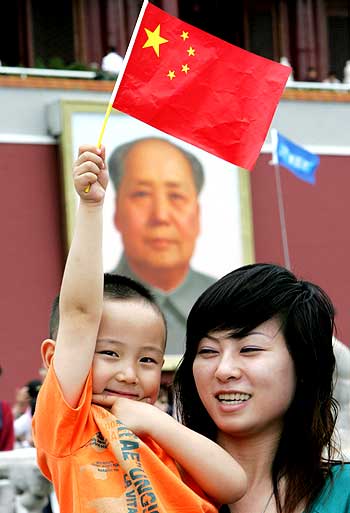
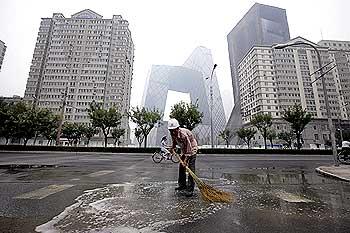

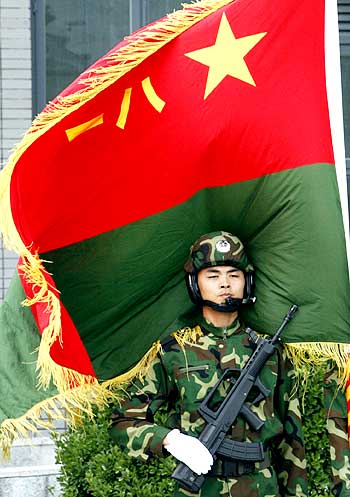
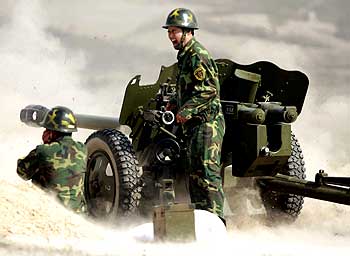
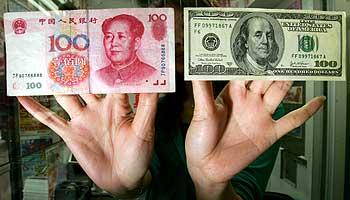
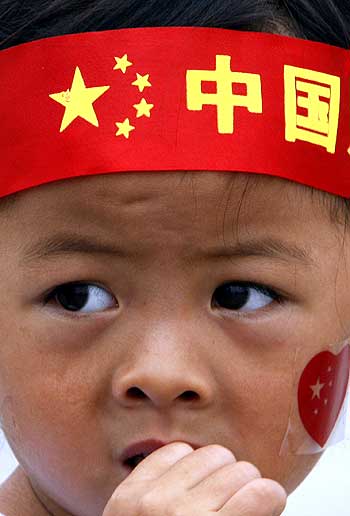
article